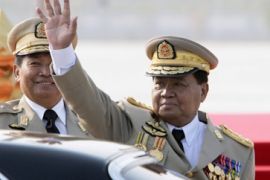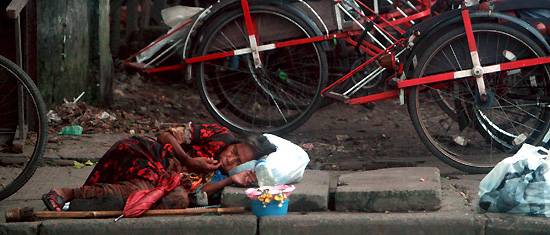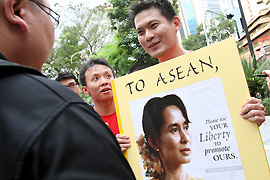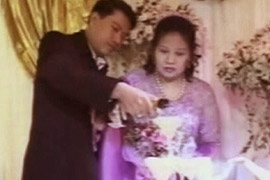Myanmar marks independence day
Military calls for discipline in aftermath of crackdown on democracy protests.

 |
| Six decades after independence from British rule, millions in Myanmar live in poverty [EPA] |
Myanmar‘s ruling military has called for “discipline” as the country marks 60 years of independence from Britain.
The country has spent much of the past six decades under military rule and is still reeling from a violent crackdown on pro-democracy protests last September.
Friday’s anniversary was marked with a simple flag-raising ceremony and a message from the country’s secretive senior ruler, General Than Shwe.
In the message he made no mention of the September protests – which were triggered by a sudden hike in the price of fuel – nor of the government crackdown on monks and pro-democracy activists who led the demonstrations.
 |
| Democracy activists are calling for greater international pressure on Myanmar [EPA] |
Instead Than Shwe reiterated that the military would make democratic reforms according to its own so-called “road map” – a drawn out process which is supposed to culminate in elections at an unspecified date.
Myanmar‘s last election held in 1990 resulted in a landslide win for the National League for Democracy, the party led by Aung San Suu Kyi, the daughter of Myanmar‘s assassinated independence hero, Aung San.
But the military refused to recognise the result, and Aung San Suu Kyi has spent most of the years since living under house arrest.
In 1991 she won the Nobel Peace Prize “for her non-violent struggle for democracy and human rights”, the Nobel committee said.
In his message, published in Myanmar‘s three state-run newspapers, Than Shwe called for the country’s co-operation in building what he called a “discipline-flourishing democratic state”.
He said the country’s eventual constitution was being drafted according to the “fundamental principles” outlined by a constitutional convention, which recently wrapped up after 14 years of rambling meetings.
Than Shwe’s message was also read aloud by a government official at an annual flag-raising ceremony in a park in Yangon, the former capital, where witnesses reported tight security in case of further protests.
Mismanagement
| Myanmar timeline |
|
1962 – Coup led by General Ne Win overthrows democratically elected government, establishes “Burmese Way to Socialism” 1974 – New constitution transfers military power to People’s Assembly led by Ne Win 1988 – Military crushes pro-democracy student demonstration, thousands reportedly killed and hundreds jailed. 1989 – State Law and Order Restoration Council (SLORC) declares martial law, arrests pro-democracy leader Aung San Suu Kyi, changes country name to Myanmar 1990 – Aung San Suu Kyi’s National League for Democracy records landslide victory in national elections, but military refuses to recognise results 1992 – Reclusive General Tan Shwe takes over as head of military government 1995 – Aung San Suu Kyi released from house arrest after six years. She is repeatedly placed under house arrest later 1997 – Association of Southeast Asian Nations (Asean) admits Myanmar into regional grouping 2003 – PM Khin Nyunt proposes new constitution as part of “road map” to democracy 2004 – Government and major ethnic rebel movement Karen National Union call a truce 2006 – Nation’s capital moved from Yangon to remote town of Naypyidaw 2007 – Sudden massive hike in fuel prices triggers biggest show of public dissent since 1988. After weeks of protests military launches violent crackdown against demonstrators, sparking world outrage |
At the time of independence in 1948 what was then known a Burma was regarded as one of South-East Asia‘s richest economies, boasting an educated work force and a developed agricultural base.
But years of military rule and economic mismanagement – many policies are said to have been based on the advice of a soothsayer – the country now languishes as one of the poorest in Asia.
In 1987, what had been one of Asia‘s brightest hopes was dropped to the ignominious position of “least developed country” status by the United Nations.
Today many of Myanmar‘s residents live in poverty, while aid agencies report rates of infant mortality and malnourishment comparable with some of the poorest countries in Africa.
According to the United Nations Development Programme (UNDP), 32 per cent of Myanmar‘s young children are considered underweight for their age, while more than a fifth of the population does not survive above the age of 40.
Once regarded as a regional “rice basket”, hundreds of thousands now rely on food handouts from international aid agencies.
The UNDP currently ranks Myanmar at 132 out of 177 countries in its human development index.
For the military elite and their associates, however, the situation is very different.
The military controls access to all the country’s lucrative oil, timber and gem contracts, with military leaders and their families living in luxury villas, enjoying access to overseas education and health services.
Afraid of the potential for opposition from within the country’s student population, the military has frequently closed the country’s universities.
As a result, educational standards have plummeted, while many of those with vital qualifications have fled the country in an ongoing brain-drain that has sapped the country of much-needed talent.
Among those that remain, the few expatriates and foreign diplomats based in Myanmar report a climate of fear that has only intensified in the wake of last year’s crackdown.
Controlling information
 |
| Senior General Than Shwe heads Myanmar’s secretive military government [Reuters] |
The government has blamed the protests on what it calls outside troublemakers, aided by the US state department and foreign media organisations.
According to the UN, at least 31 people were killed in the September crackdown – more than twice that admitted by the government – while an unknown number remain in jail.
In an apparent effort to restrict control to outside information, earlier this week the government ordered a massive 166-fold increase in the annual satellite television levy.
The hike saw the fee for a satellite licence jump from 6,000 kyat to 1 million kyat, or about $780 – three times average annual incomes.
Democracy groups says that for most of Myanmar’s 56 million people, access to satellite TV broadcasts by organisations such as Al Jazeera, the BBC and dissident network the Democratic Voice of Burma (DVB) has been the sole source of news.
Those broadcasts reportedly played a major role in last year’s protests, which were barely mentioned in state-run media.
Without satellite access, the only other television news is on rigidly state-controlled MRTV.
| Myanmar then and now | ||
|
At independence… One of the richest countries in South-East Asia with highly educated population World’s largest rice exporter, regarded as “rice basket of Asia” …and 60 years on One of Asia‘s poorest nations, with rising poverty levels and sky-rocketing inflation One-third of all children are malnourished, with 132,000 children under five dying every year because of avoidable diseases according to Save the Children Major heroin trafficker and world’s second-largest opium producer |

